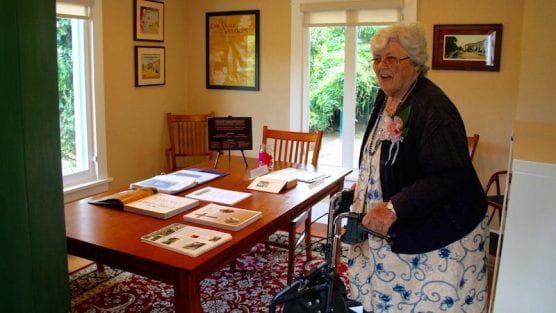 It’s a small, cozy room — only about 200 square feet — but without question is one of Ventura County’s most valuable hidden gems.
It’s a small, cozy room — only about 200 square feet — but without question is one of Ventura County’s most valuable hidden gems.
The Rancho Camulos Museum Research Library, located in the museum’s 1920 adobe restored house facing Highway 126, is home to a variety of historic treasures, including rare books, an extensive collection of books on Southern California history, historical photos, maps and documents dating from the nineteenth century.
The library and its archival collection is complemented by a treasure trove of early nineteenth and eighteenth-century artifacts original to the property.
Museum volunteers and staff recently completed cataloguing the museum’s collection of books and several of its most significant archival collections. To honor this milestone, the museum’s board of directors earlier this month named the research library in honor of Fillmore resident Marie Wren, who served as a charter volunteer for the National Historic Landmark’s and the nonprofit’s first docent council chair more than twenty years ago.
More recently Wren donated more than 200 books from her personal collection on Southern California, California and American West history and fiction to the library. Wren also made a handsome donation to Rancho Camulos that enabled the museum to purchase shelving, furnishings, and archival supplies, creating a comfortable working space for researchers and the museum’s archival staff.
“Without Marie’s dedication to Rancho Camulos Museum, her support of our research library and generous donation, we would not have been able to make this happen, notes Dr. Susan Falck, the museum’s executive director. “She is truly an inspiration to everyone who works on behalf of this museum. Her passion for California history and Rancho Camulos history is contagious.”
Prior to the creation of the museum library and research center, much of the museum’s artifacts and archival materials lay scattered among several rooms and buildings on the twelve-acre museum grounds. In early 2014, volunteers began gathering these materials for safekeeping. Once the 1920 adobe was restored it became possible to begin cataloging and conserving numerous documents and artifacts.
Dianne Cox, who has served as a museum volunteer for 13 years, led this sizable undertaking and has put countless hours into creating a comfortable, well-organized workspace, meticulously cleaning and conserving fragile items and later helping to catalogue the materials along with Falck and museum board member Meredith McGowan, who works as a professional librarian for Los Angeles County.
“Working with Marie in the library, sorting and cataloging her books, and listening to her stories, was a wonderful experience for me,” notes Cox. “It was obvious she loved her books and she loved history.”
 Wren, a native of Oklahoma who moved to Fillmore in 1947, joined the museum as a volunteer shortly after the 1994 Northridge Earthquake severely damaged several buildings at Rancho Camulos. She has served as one of the museum’s strongest advocates over the years, helping raise funds to restore the museum’s 19th-century buggy and other projects, recruiting new volunteers, developing the museum’s tour program and uncovering the history of Camulos Ranch by steadily acquiring books about rancho and Southern California history.
Wren, a native of Oklahoma who moved to Fillmore in 1947, joined the museum as a volunteer shortly after the 1994 Northridge Earthquake severely damaged several buildings at Rancho Camulos. She has served as one of the museum’s strongest advocates over the years, helping raise funds to restore the museum’s 19th-century buggy and other projects, recruiting new volunteers, developing the museum’s tour program and uncovering the history of Camulos Ranch by steadily acquiring books about rancho and Southern California history.
Recently, a collection of vignettes Wren wrote about local families and events that appeared in local newspapers was published as Stories to Be Told: Tales about the pioneer people and places in little Santa Clara River valley, Southern California.
Over the past several years Rancho Camulos has opened its collection to scholars from Yale University, UC Berkeley, Loyola Marymount and Cal State graduate students eager to learn more about the rancho era in Southern California and the families and laborers who established and operated one of the oldest and most successful agricultural operations in Ventura County.
The museum also periodically loans out items from its collection to other institutions. Currently, the Smithsonian’s Museum of American History is showcasing several religious artifacts from Rancho Camulos in an exhibit entitled “Many Voices, One Nation.”
Once the pandemic has subsided, the museum looks forward to once again making its research collection accessible to the public, according to Falck. “In the meantime, we continue organizing our collection and uncovering new treasures.”
To learn more about the Rancho Camulos Museum Research Library, email info@ranchocamulos.org or visit the museum’s website at www.ranchocamulos.org.
Like this:
Like Loading...
Related





 Tweet This
Tweet This Facebook
Facebook Digg This
Digg This Bookmark
Bookmark Stumble
Stumble RSS
RSS






























REAL NAMES ONLY: All posters must use their real individual or business name. This applies equally to Twitter account holders who use a nickname.
0 Comments
You can be the first one to leave a comment.